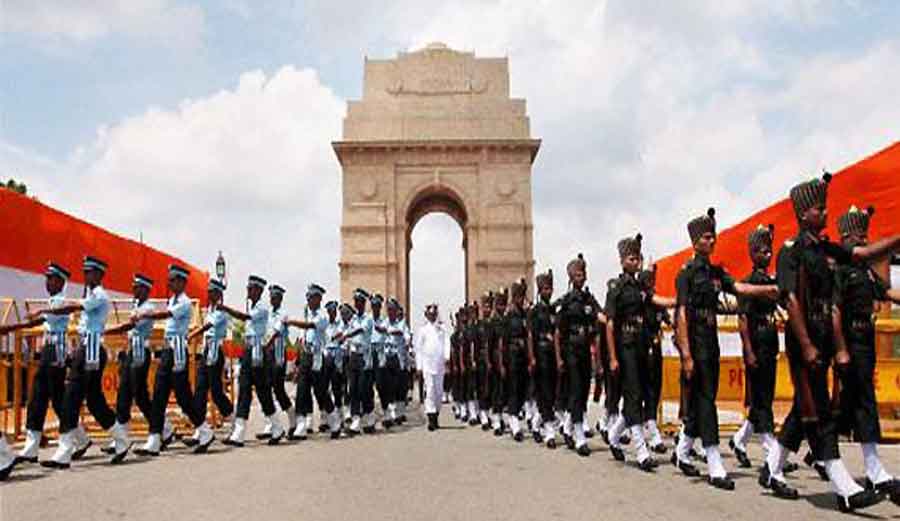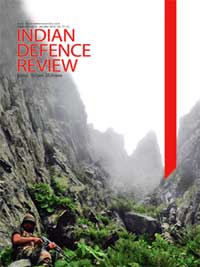Over the following decades, while the nation’s military capability went through cycles of rise and fall depending upon the degree of the Government’s geo-strategic naivety, denigration of the soldiery proceeded unhindered, some by contrived default and some by manipulative designs of the defence managers. Blatant tricks in ‘saving’ money against military expenditure and to keep the forces in perpetual state of ‘want’ seemed to have become a cause celebre among the defence bureaucracy – with ready endorsement of their political masters, of course.
“A country that refuses to respect its armed forces will eventually end up getting forces that will not respect the nation’s aspirations”.
An Institution Exclusive
The tradition of celebrating the soldiery is a profitable lesson that the state-societies have learnt over the millennia of their existence…
Nation-states raise military institutions to protect their sovereign interests in a compellingly predatory world and when more agreeable methods of dispute resolution fail to deliver. They do so at excruciatingly heavy economic, but more than that societal, costs because irrespective of the outcomes, military ventures tend to leave permanent marks on a nation’s mind.
As the ultimate recourse open to the preservation of national interests against forces inimical, members of the military institution are ‘commissioned’ – civilian employees of the state are but ‘appointed’ – by the state-society to perform such assignments which demand extreme means and methods extra-ordinary. To do so, the military personnel must be prepared to suffer exactions which run contrary to the innate human instincts of finding stability, safety and freedom. War, after all, gives no quarter and leaves no sufferings avoidable.
The State-Society-Soldier Covenant
To undertake that kind of demanding mission, the state musters from among its citizens, persons ingrained with extraordinary spirit and motivation, psychological robustness and physical endurance, and while divesting them of many of the rights of citizenship, invests on their elaborate training, healthy upkeep and provision of best weaponry and equipment, for them to shoulder their duty with the best chances of success and survival. That indeed, is a hoary – and holy – covenant between the state-society, the supreme organiser of the nation, and its soldiers, sailors and airmen, its ultimate saviours.
Neither is soldiering a part time play-act nor is war a forgiving calling…
The most sanctified covenant between the state-society and its military institution, however, is manifested by former’s celebration of the ‘calling’ of the military profession and the reverence that it reserves for its soldiery, both being aimed at keeping the nation’s saviours in high state of motivation. The tradition of celebrating the soldiery is a profitable lesson that the state-societies have learnt over the millennia of their existence: high morale among the soldiery brings better dividends on the state’s investment on its military power. Accordingly, the state sanctions to its soldiery, out-of-ordinary constitutional, legal and administrative dispensations and undertakes to attend to the latter’s domestic wellbeing, thus leaving them free of private anxieties to dedicate wholeheartedly to their tedious responsibilities.
More notably, the state undertakes to shield the soldiery from having to canvass for their causes and concerns, taking upon itself that responsibility on their behalf. This is an old established practice that saves the soldiery from exposure to crafty machinations of the system and allows them to revel in their sublime character. That indeed had been the practice followed by all the great Indian Empires of the past – Maurya, Gupta, Mughal and British.
The Soldier’s Vow
In response, the soldiery undertakes to fight and win the wars which the state’s rulers are compelled to wage. Since war-fighting, for all its suffering and destructiveness, requires the strength of spiritual invocation to undertake, it makes it obligatory for the military personnel to observe the highest standards of courage, fortitude and probity. It is the strength of these sublime characteristics that drives the soldiery to engage in battles known to be hopeless or to close-in with terrorists when no one would know if they let go.
Nation-states raise military institutions to protect their sovereign interests in a compellingly predatory world…
Conversely, it is to the purpose of upholding those standards of conduct that the soldier must be called to order, notably by his own colleagues, for misdemeanours minor and major – even suffer the capital punishment for letting the cause down – while graver culpabilities of the members of political, administrative and police establishments may escape arraignment. Truly, it is in response to that pristine state-society-soldier covenant that the soldiery bears with its circumstances in fortitude, and recusing from public discourse, leave the matter of protection of their temporal interests for the state-apparatus to address.
This is the universally recognised covenant on which stands the state-society-soldiery trust; indeed, this covenant is fundamental to the state-society-military bonding.
State-Veteran Interdependency
As a corollary to the fulfilment of its excruciating mandate that no ordinary citizen would, or could, be expected to perform, the military institution is obliged to nurture an exclusive culture of its own. Cultivated with the state-society’s due encouragement that distinct culture must merge into the core character of the military rank and file, permanently, for neither is soldiering a part time play-act nor is war a forgiving calling. Thus when having fulfilled their vow to the state-society, the soldiers are allowed to turn into veterans and repair to the civil street, they cannot but continue to adhere, proudly and demonstratively, to the military culture.
More significantly, culture, being a life-long affinity, continues to bind the serving soldiery and the veterans into one monolith fraternity. Indeed, in-service soldiers and veterans bond with each other so closely that one answers for the other; it is difficult to segregate the two into distinct entities. Notably, the beneficiary of that spiritual bondage happens to be the state-society, for it fosters irresistible motivation for the soldier to uphold, even against fearful odds, the glory earned by the veteran.
How well the state shoulders that burden determines the level of motivation among its soldiery…
On the flipside, the noble military culture tends to render vulnerable its personnel to the barbs of the usual societal machinations and mischiefs. When it comes to the veterans, they being bereft of institutional protection, that vulnerability is further exacerbated. And herein comes the state’s responsibility in protecting its soldier-citizens’ interests. As political philosophers through the ages have averred, just as the ideology of the ‘state’ devolves upon the promises of security, welfare and rule of law for its citizens, similarly, when it comes to the soldiers and veterans, the spirit of that promise extends to underwriting their well-being.
As to how well the state shoulders that burden, determines the level of motivation among its soldiery. Creation of an exclusive department of veterans’ welfare within the state-apparatus is a recourse to that end – an unique instance of the state remaining committed to the wellbeing of its erstwhile employees. Obviously, there is a life-long relationship between the state and its constituency of the venerated veterans.
There is another aspect of state-veteran interdependency. Rather than sequestering the veterans to hibernate under a sort of one-way ‘pay-back’ for their past service, most countries uphold the wisdom of coupling the state-veteran relationship into a mutually beneficial intercourse. Thus there is the practice of reserving second employment for the veterans – most of whom are actually in their middle age – and inducting them into the civil sector, the purpose being to harness their characteristic nobility and skills in managing hard challenges. If the covenant discussed above is upheld universally, let us then see as to how has it worked in the Indian state.
Blatant tricks to ‘save’ money against military expenditure and keep the forces in a perpetual state of ‘want’ seem to have become a cause celebre among the defence bureaucracy…
The Covenant in Indian Context
Truly, through the times ancient, the Indian state and society had favoured the covenant; the soldiery and the society continue to do that. The sacred trust manifests when apart from war, people in trouble – in riots, calamities and even to pull out a child from a bore well – seek confidence in military presence. But then, when after centuries of exclusion from statecraft, Independence brought to it the inheritance of a world-celebrated military machine in the form of the Indian Armed Forces, a deliberate affliction for self-subversion gripped the Indian state. With the political class finding military values in divergence from theirs and the cabal of civilian bureaucracy finding an opportunity to satiate the pen-pushers’ age-old complex against smart, bold, efficient and gallant men military, undermining the military institution through contrived insinuations, canards and excommunication grew into a term of reference in the state-apparatus.
It was obvious that the newly anointed state-apparatus of the post-independence era did not understand the spirit behind the state-soldier-veteran covenant and viewed the service headquarters as any other entity of sundry consequence – except when needed to bail itself out from the consequences of war, insurgencies, natural calamities and mayhem – all of its own doing.
Similarly, the department of ex-servicemen welfare, a red-tape bound entity to park surplus civil servants, seemed to be intent on capping rather than promoting their purpose. The concocted view of the military institution starkly manifested in the state’s indifference to equipping its military forces with the requisite war wherewithal to fulfil its mandate specified and surreptitious undermining of the soldiery’s sanctified bestowals in the form of emoluments, pension and land allocation.
More damage was inflicted when, on the one hand, the purely military-dedicated service providers – defence research, estates, engineering and industrial establishments, for example – were set free form accountability towards the military institution, while on the other hand, somersaulting over its sanctified responsibilities, the state compelled the military establishment to shoulder the veterans’ health scheme, and burdened the fighting forces with retention of medically wasted personnel rather than rehabilitating them in civil sector. Instances of the civil administration, and even lower judiciary, failing to shield the domestic interests of military personnel against crass machinations of crooks, and nonchalant sitting over accumulated welfare funds in the government treasury rather than committing these to the right purpose, are some more manifestations of the state’s failure in upholding its part of the covenant.






